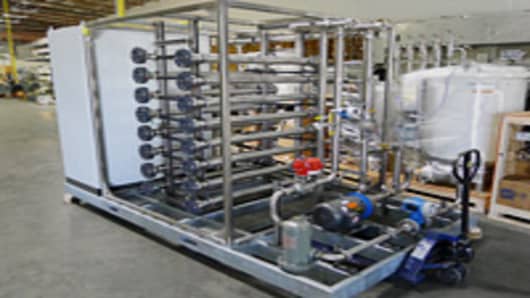The U.S. natural gas boom has kicked off a gold rush among clean tech firms trying to cash in on minimizing the industry’s environmental footprint.
“There’s a real feeding frenzy,” says Dallas Kachan, founder of clean tech research firm, Kachan and Co.
He says he even sees vendors of technologies that may not have targeted the energy sector “rushing to retool their products for the high visibility, high growth fracking and oil-sands markets.”
According to the U.S. Energy Information Administration , natural gas is poised to become nearly 50 percent of the national fuel mix by 2030, up from 23 percent in 2009.
With that massive growth coming primarily from shale-gas deposits that require fracking, the cleanup opportunity is huge.
Boutique research firm Lux Research says it expects the market for fracking-related water treatment will grow nine?fold to $9 billion in 2020.
The main issues are quality and quantity of wastewater from fracking. There is “flowback” water that’s left over after injection for the process, and “produced” water, the kind that may be unleashed by the rock fracturing from inside the shale deposit.
Both types of water can be a “toxin?laced brine that can be more than six times as salty as the sea,” says Lux analyst Brent Giles.
This expansion will spur innovation and novel thinking about water disposal and reuse, but the field is already getting crowded, says Giles, who authored a recent report on the water treatment market.
In the past, used frack water was often moved offsite and stored in underground injectable wells.
But the rapid growth in the northeastern Marcellus shale-gas field — spanning parts of New York, Ohio, Pennsylvania and West Virginia — has few of those storage opportunities, meaning drillers must treat the water.
“Fracking represents a significant water treatment challenge — hydrocarbons, heavy metals, microbes and salts,” says Giles. He says the fluid represents “a water treatment challenge on par with the most difficult industrial wastewaters.”
According to Lux, fracking requires 25,000-140,000 barrels of water per well, and all that water needs to be cleaned and disposed of.
Kachanestimates that each of the 3,000-plus wells drilled in the Marcellus field results in up to 15,000 gallons of produced water, too.
Treatment costs vary widely, and the gas industry closely guards its recipes for the fracking fluid injected into the ground to fracture the well.
Sara Banaszak, chief economist with the America’s Natural Gas Alliance , a leading trade group, says there can be a “huge variance” from well to well, depending on how deep you drill and the quality of the shale itself, making per-well costs hard to average out.
Riggs Eckelberry, CEO of OriginOil , a biofuels firm now active in frack water treatment, says wastewater handling at similar oil sites costs 11-22 cents per gallon.
Water may be plentiful in the Marcellus area, but in other areas, like the Barnett shale-gas field in Texas and the Rocky Mountain region, fracking water relies on groundwater aquifers or rivers that are already claimed for other purposes, like crop irrigation and human consumption.
Treatment, say experts, will be a higher priority, and more costly.
With much attention focused on fracking practices, energy-market giants are taking the hint.
Drilling firm Halliburton has a “long term alliance” with WaterTectonics to use its technology to remove hydrocarbons, heavy metals and biological matter from frack water, according to Lux.
Chevronis working with GasFrac , which uses high-pressure propane, rather than high pressure water, to fracture wells.
Treating frack water versus shipping and storing it has clear upside.
Chesapeake Energy claims its wastewater treatment activities in the Marcellus region save the company $6 million in 2011.
Contaminants “come out of solution very quickly,” Eckelberry says about his firm’s technology, which is the lab stage now but is expected "to be in the field soon.”
Eckelberry says the gas industry could be a critical new revenue stream for companies like his, but Lux's Giles says they could be late to the game.
“Only a few companies are really positioned to profit,” says Giles. “Nearly every start?up we talk to is going after frack water, regardless of their technology, and many of them are going to come to grief.”


